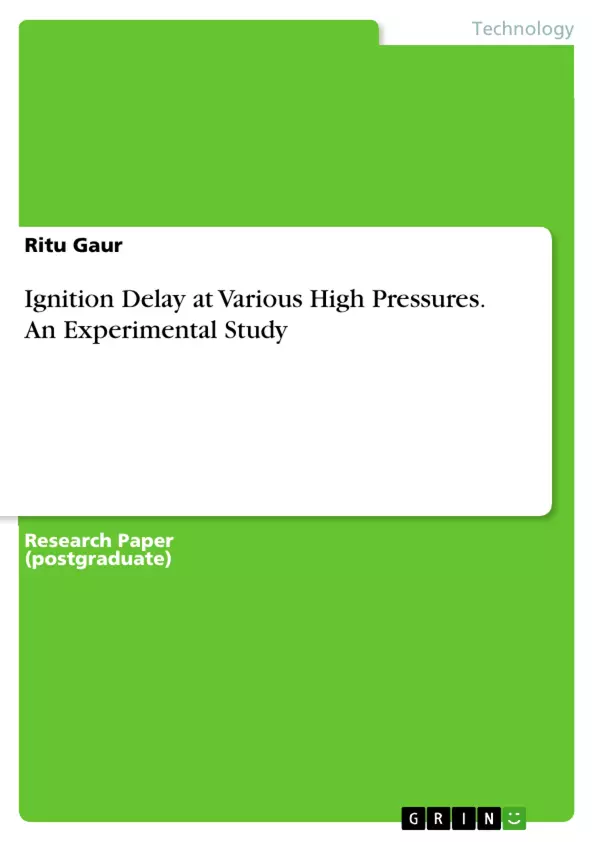This work is an experimental study for the measurement of ignition delay characteristics of burning fuel sprays in cylindrical combustion chambers. It is carried out on hot air and high pressure. The objective of the study is to investigation the effect of hot air temperature and a well as high pressure on ignition delay of diesel fuel sprays.
The effect of blending of n-Pentane with pure diesel was investigated. An experimental set up was design for this purpose with the emphasis on optical method for measurement of ignition delay at various pressures. The results presented here show that ignition delay of diesel fuel spray decreases with increase in the temperature and pressure of hot air. Results also show the effect of methyl group being more dominant at low ignition temperatures and that of alkyl group being more dominant at higher temperature.
Blending of n-pentane with diesel fuel, increase its ignition delay at low ignition temperatures. However, as the concentration of blending fuel was increased beyond 30%, the ignition temperature increase. Ignition temperature for 40% pentane blends is much higher that the pure diesel.
Table of Contents
- INTRODUCTION
- 1.1 Diesel Combustion
- 1.2 Ignition Delay
- 1.2.1 Factors Affecting Ignition Delay:
- 1.2.2 Chemical Factors
- 1.3 Diesel Fuel Chemistry
- 1.5 Test Procedure
- RESULTS AND DISCUSSION
- CONCLUSION AND FUTURE INVESTIGATIONS
- REFERENCES
Objectives and Key Themes
The study investigates the ignition delay characteristics of diesel fuel sprays in a cylindrical combustion chamber under various high pressures and hot air temperatures. The primary objective is to determine the impact of these factors on ignition delay and analyze the effects of blending n-pentane with pure diesel fuel.
- Effect of temperature and pressure on ignition delay of diesel fuel sprays
- Influence of n-pentane blending on ignition delay
- Role of methyl and alkyl groups in ignition delay at different temperatures
- Impact of fuel composition on ignition quality
- Analysis of the combustion process in diesel engines
Chapter Summaries
The introduction provides an overview of diesel combustion and the concept of ignition delay. It explains the factors influencing ignition delay, including chemical factors and the importance of cetane number in evaluating fuel quality. The chapter also delves into diesel fuel chemistry, discussing various properties and the role of different hydrocarbon components in ignition quality.
The results and discussion section presents the findings of the experimental study, examining the impact of temperature, pressure, and n-pentane blending on ignition delay. This section likely analyzes the experimental data and provides insights into the mechanisms behind the observed trends.
Keywords
The primary keywords include ignition delay, diesel fuel, combustion chamber, high pressure, hot air temperature, n-pentane blending, cetane number, fuel composition, ignition quality, and diesel engine emissions. The research focuses on understanding the influence of these factors on the combustion process and ultimately on reducing emissions from diesel engines.
Frequently Asked Questions
What is ignition delay in diesel engines?
Ignition delay is the period between the start of fuel injection and the onset of combustion, which significantly affects engine performance and emissions.
How do temperature and pressure affect ignition delay?
Experimental results show that ignition delay of diesel fuel sprays decreases as both the temperature and pressure of the hot air increase.
What happens when n-pentane is blended with diesel?
Blending n-pentane with diesel increases the ignition delay at low temperatures. However, if the concentration exceeds 30%, the ignition temperature also increases significantly.
What are the chemical factors influencing ignition quality?
The study highlights the role of methyl groups, which are more dominant at low temperatures, and alkyl groups, which dominate at higher ignition temperatures.
What is the importance of the cetane number?
The cetane number is a measure of a fuel's ignition quality; higher values indicate shorter ignition delays and better combustion characteristics.
- Quote paper
- Ritu Gaur (Author), 2019, Ignition Delay at Various High Pressures. An Experimental Study, Munich, GRIN Verlag, https://www.grin.com/document/504907



